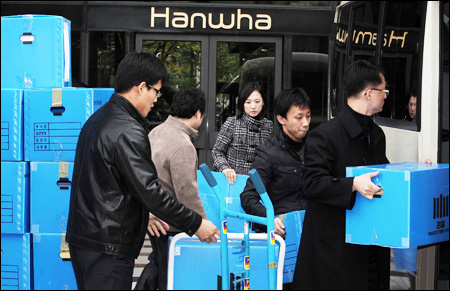Chaebol under siege

The Lee Myung-bak administration, grappling with a series of scandals involving the President’s confidants, has mobilized the prosecution, tax authorities and anti-trust agencies to stage an onslaught on large family-controlled corporations. This is seen as a desperate attempt by the current administration to improve its standing with the public and reverse the lame duck status of President Lee, who will leave Cheong Wae Dae in nine months.
Conglomerates targeted in lame duck presidency
As the economy turns from bad to worse with income polarization widening and inflation soaring, large family-controlled business groups, known here as chaebol, have become public enemy No.1.
Despite the prolonged global economic downturn, Samsung and other leading conglomerates have earned record overseas profits through exports of electronics, cars and other industrial goods, while small businesses struggle to stay afloat amid stagnant domestic demand.
Likewise, households flounder under piles of debt and are forced to pay more for various goods and services as the value of their incomes fall.
In the face of such economic hardship, small firms and households have vented their anger at big businesses and those on top, claiming chaebol rake in huge profits at their expense.
Recognizing the anti-chaebol sentiment, the Lee Myung-bak administration, already grappling with a series of scandals involving the President’s confidents, has mobilized the prosecution, tax authorities and the anti-trust agency to stage an onslaught on the large family-controlled conglomerates.
But this is seen as a desperate attempt by the current administration to improve its standing with the public and reverse the lame duck status of President Lee, who will leave Cheong Wae Dae in nine months.
In response, large businesses have taken a cautious approach toward chaebol bashing, saying the anti-business sentiment is not good for the Korean economy.
They say current government moves could have a negative impact on business sentiment and that companies will likely refrain from making investments that will adversely affect the administration’s job creation campaign.
Under tax probe
Last month, the National Tax Service (NTS) imposed 470 billion won ($416 million) in back taxes and fines on Samsung Electronics because the technology giant dodged corporate tax by manipulating prices when trading with overseas subsidiaries.
The tax agency is now looking into other affiliates of the Samsung Group, such as Samsung SDI and Samsung Heavy Industries, on whether or not they have engaged in dubious practices to evade paying corporate income tax.
Additionally, SK Engineering and Construction, a construction unit of SK Group, has been undergoing a special tax audit. The probe came after SK Chairman Chey Tae-won was indicted but not detained in January on charges of embezzling company funds to cover losses from his futures investments. His younger brother Jae-won, a former senior SK Group vice chairman, was put behind bars for misappropriating corporate funds.
LG Electronics has also undergone a tax probe, while its affiliate LG Display has been investigated by the prosecution over allegations that the firm stole OLED technologies from rival firm Samsung Mobile Display.
Pressing large retailers
The Fair Trade Commission (FTC) has been leading the Lee administration’s aggressive campaign to force the nation’s three largest department stores — Lotte, Shinsegae and Hyundai — to share profits with their suppliers and tenants.
Early this year, department stores were forced by the FTC to cut rental fees charged to tenants who sell merchandize by leasing space. This sent their share prices plunging and negatively affected their first-quarter performance.
They are now asked to open new sections and sell products exclusively from small and medium-sized manufacturers.
At the same time, large discount stores have become a victim of President Lee’s campaign to throw away his pro-rich image.
E-Mart, Home plus, and Lotte Mart have been forced to close their outlets twice a month since April, under revised rules designed to boost businesses for smaller mom and pop stores and traditional markets, which have lost customers to the retail giants over the years. Retailers say that due to the rule, their sales declined by about 4.5 percent.
`Chaebol bashing no good for Korea’
Despite the ongoing chaebol bashing, the largest business groups have largely remained silent, thinking that an aggressive response could backfire and further aggravate the already unfavorable public sentiment. However, they say the recent anti-business sentiment has gone too far.
“We admit that some conglomerates have to operate more transparently and treat small partners more fairly. Also, consumers should be treated better in some cases. But this cannot justify an outright bashing against all big companies,” said Kang Seok-gu, director of corporate policy team at the Korea Chamber of Commerce and Industry.
Kang said some of the regulations recently introduced by the government do not make much sense, adding this does the economy no good.
“Government officials and politicians have taken a range of unfriendly corporate policies over the past year for purely political reasons. This does not help encourage companies to expand investment and create jobs,” the director said.

























































